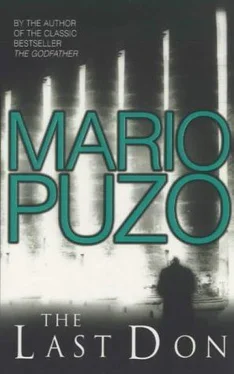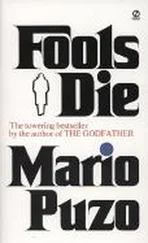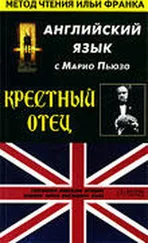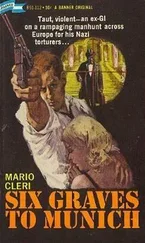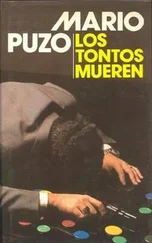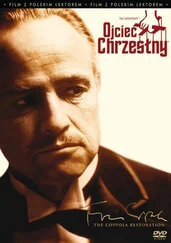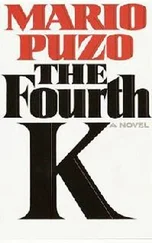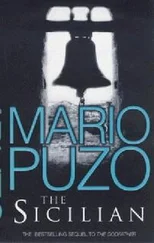Only the Clericuzio clan had the courage to oppose Fascist decrees with force. They murdered the local Fascist prefect, they attacked Fascist garrisons. Most infuriating of all, when Mussolini gave a speech in Palermo they stole his prized bowler hat and umbrella imported from England. It was this peasant humor and contempt, which made a laughingstock of Mussolini in Sicily, that finally led to their ruin. There was a massive concentration of armed forces in their province. Five hundred members of the Clericuzio clan were killed outright. Another five hundred were exiled to the arid islands in the Mediterranean that served as penal colonies. Only the very heart of the Clericuzio survived, and the family shipped young Domenico Clericuzio to America. Where, proving that blood will tell, Don Domenico built his own empire, with far more cunning and foresight than his ancestors had shown in Sicily. But he always remembered that a lawless state was the great enemy. And so he loved America.
Early on he had been told the famous maxim of American justice, that it was better that a hundred guilty men go free than that one innocent man be punished. Struck almost dumb by the beauty of the concept, he became an ardent patriot. America was his country. He would never leave America.
Inspired by this, Don Domenico built the Clericuzio empire in America more solidly than the clan had in Sicily. He ensured his friendship to all political and judicial institutions with great gifts of cash. He did not rely on one or two streams of income but diversified in the finest tradition of American business enterprise. There was the construction industry, the garbage disposal industry, the different modes of transportation. But the great river of cash came from gambling, which was his love, in contrast to the income from drugs which, though most profitable, he distrusted. So in later years it was only in gambling that he allowed the Clericuzio Family to be involved operationally. The rest wetted the Clericuzio beak with a tithe of 5 percent.
After twenty-five years the Don's plan and the dream was coming true. Gambling was now respectable and, more important, increasingly legal. There were the ever-burgeoning state lotteries, those swindles perpetrated by the government on its citizens. The prizes stretched over twenty years, which, in effect, amounted to the state never paying the money at all, just the interest on the money withheld. And then that was taxed in the bargain. What a joke. Don Domenico knew the details, because his Family owned one of the management companies that ran the lottery for several states at a very good fee.
But the Don was banking on the day when gambling on sports would become legal in all the United States as it was now legal only in Nevada. He knew this from the tithe he collected on illegal gambling. Profits on the Super Bowl football game alone, if gambling became legal, would come to a billion dollars, in just one day. The World Series with its seven games would yield equal profit. College football, hockey, basketball, all rich streams. Then there would be intricate, tantalizing lotteries on sports events, legal gold mines. The Don knew he would not live to see that glorious day, but what a world it would be for his children. The Clericuzio would be the equal of the Renaissance princes. They would become the patrons of art, advisors and leaders of government, respectable in history books. A trailing cloak of gold would brush out its origins. All his descendants, his followers, his true friends, would be secure forever. Certainly the Don had the vision of a civilized society, the world, as this great tree shedding the fruit that must feed and shelter humanity. But in the roots of this great tree would be the immortal python of the Clericuzio, sucking nourishment from a source that could never fail.
If the Clericuzio Family was the Holy Church for the many Mafia empires scattered over the United States, then the head of the Family, Don Domenico Clericuzio, was the Pope, admired not only for his intelligence but for his strength.
Don Clericuzio was also revered for the strict moral code he enforced in his Family. Every man, woman, and child was completely responsible for his actions, no matter the stress, the remorse, or the hard circumstances. Actions defined a man; words were a fart in the wind. He disdained all social sciences, all psychology. He was a devout Catholic: payment for sins in this world, forgiveness in the next. Every debt had to be paid, and he was strict in his judgment in this world.
As in his loyalty. The creatures of his blood first; his God second (did he not have his own chapel in the house?); and third, his obligation to all the subjects in the domain of the Clericuzio Family.
As for the society, the government — patriot though he was — never entered the equation. Don Clericuzio had been born in Sicily, where society and the government were the enemy. His concept of free will was very clear. You could will yourself as a slave to earn your daily bread without dignity or hope, or you earned your bread as a man who commanded respect. Your Family was your society, your God was your punisher, and your followers protected you. To those on earth you owed a duty: that they would have bread to put in their mouths, respect from the world, and a shield from the punishment of other men.
The Don had not built his empire so that his children and his grandchildren would someday recede into a mass of helpless humanity. He built and kept building power so that the Family name and fortune would survive as long as the Church itself. What greater purpose could a man have in this world than to earn his daily bread, then in the next world to present himself to a forgiving deity? As for his fellow man and their faulty structures of society, they could all swim to the bottom of the ocean.
Don Domenico led his Family to the very heights of power. He did so with a Borgia-like cruelty and a Machiavellian subtleness, plus solid American business know-how. But above all with a patriarchal love for his followers. Virtue was rewarded. Injuries avenged. A livelihood guaranteed.
Finally, as the Don had planned, the Clericuzio reached such a height that it no longer took part in the usual operations of criminal activity except in the most dire circumstance. The other Mafia Families served chiefly as executive Barons, or Brugliones, who when in trouble went to the Clericuzio hat in hand. In Italian the words «Bruglione» and «baron» rhyme, however in the Italian dialect «Bruglione» means someone who fumbles the smallest tasks. It was Don Domenico's wit, sparked by the Barons' constant pleas for help, that changed the word «baron» to Bruglione. The Clericuzio made peace between them, sprang them from jail, hid their illegal gains in Europe, arranged foolproof ways for them to smuggle their drugs into America, used its influence with judges and different government regulators, both federal and state. Help with municipalities was usually not required. If a local Bruglione could not influence the city he lived in, he was not worth his salt.
The economic genius of Don Clericuzio's oldest son, Giorgio, cemented the Family power. Like some divine laundress he washed the great spouts of black money that a modern civilization spews from its guts. It was Giorgio who always tried to moderate his father's ferocity. Above all, Giorgio strove to keep the Clericuzio Family out of the glare of public notice. So the Family existed, even to the authorities, like some sort of UFO. There were random sightings, rumors, tales of horror and benignity. There were mentions in FBI and police department files, but there were no newspaper stories, not even in those publications that gloried in depicting the exploits of various other Mafia Families who, through carelessness and ego, came to misfortune.
Not that the Clericuzio Family was a toothless tiger. Giorgio's two younger brothers, Vincent and Petie, though not as clever as Giorgio, had almost the Don's ferocity. And they had a pool of enforcers who lived in an enclave of the Bronx that had always been Italian. This enclave of forty square blocks could have been used in a film of Old Italy. There were no bearded Hasidic Jews, blacks, Asians, or bohemian elements in the population, nor did any of these own a business establishment there. There was not one Chinese restaurant. The Clericuzio owned or controlled all real estate in the area. Of course some of the Italian families' progeny sprouted long hair and were guitar-playing rebels, but these teenagers were shipped to relatives in California. Every year, new, carefully screened immigrants from Sicily arrived to repopulate. The Bronx Enclave, surrounded by areas with the highest crime rate in the world, was singularly free of evildoing.
Читать дальше
